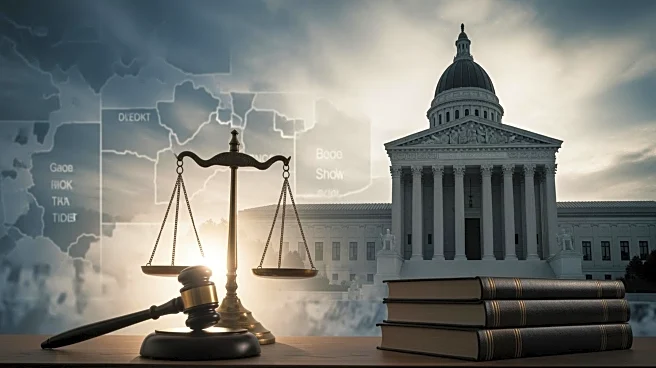What's Happening?
The U.S. Supreme Court is currently deliberating on a case that could significantly alter the application of the Voting Rights Act, particularly concerning race-based electoral districts. The case involves a challenge to a Black majority House district in Louisiana,
which the court's conservative justices appear inclined to strike down due to its heavy reliance on race. This decision could lead to a fundamental change in the voting rights law, which has historically been pivotal in reducing racial discrimination in voting. The court's previous rulings, including a 5-4 decision affirming a violation of the Voting Rights Act in Alabama, have set precedents that are now being reconsidered. Chief Justice John Roberts and Justice Brett Kavanaugh have expressed skepticism about the continued necessity of race-based districts, suggesting a shift in judicial perspective.
Why It's Important?
The potential ruling by the Supreme Court could have widespread implications for congressional redistricting across the Southern United States. If the court decides to limit or strike down the use of race-based districts, it could enable state legislatures to redraw electoral maps without constraints, potentially leading to increased gerrymandering. This could bolster Republican electoral prospects by eliminating districts that favor minority voters, who typically support Democratic candidates. The decision could also impact the balance of power in Congress, affecting legislative priorities and the representation of minority communities. The case underscores ongoing debates about race, representation, and electoral fairness in U.S. politics.
What's Next?
Should the Supreme Court rule against the use of race-based districts, states may begin redrawing their congressional maps, potentially leading to legal challenges and further court battles. Civil rights groups and minority communities are likely to contest any changes that diminish their electoral influence. The decision could also prompt legislative efforts to address or counteract the court's ruling, possibly through new voting rights legislation. Political leaders and advocacy groups will be closely monitoring the outcome, which could set a precedent for future redistricting efforts and influence the political landscape ahead of upcoming elections.
Beyond the Headlines
The case raises deeper questions about the role of race in electoral politics and the interpretation of the Voting Rights Act. It highlights the tension between efforts to ensure fair representation for minority communities and the push for race-neutral policies. The decision could also reflect broader societal shifts in attitudes towards race and equality, influencing public discourse and policy-making. Additionally, the ruling may affect the legal framework governing electoral processes, potentially leading to long-term changes in how districts are drawn and how voting rights are protected.



















